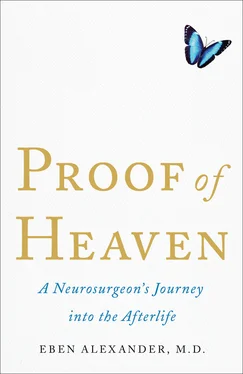E. coli are also highly promiscuous. They can trade genes with other bacterial species through a process called bacterial conjugation, which allows an E. coli cell to rapidly pick up new traits (such as resistance to a new antibiotic) when needed. This basic recipe for success has kept E. coli on the planet since the earliest days of unicellular life. We all have E. coli bacteria residing within us—mostly in our gastrointestinal tract. Under normal conditions, this poses no threat to us. But when varieties of E. coli that have picked up DNA strands that make them especially aggressive invade the cerebrospinal fluid around the spinal cord and brain, the primitive cells immediately begin devouring the glucose in the fluid, and whatever else is available to consume, including the brain itself.
No one in the ER, at that point, thought I had E. coli meningitis. They had no reason to suspect it. The disease is astronomically rare in adults. Newborns are the most common victims, but cases of babies any older than three months having it are exceedingly uncommon. Fewer than one in 10 million adults contract it spontaneously each year.
In cases of bacterial meningitis, the bacteria attack the outer layer of the brain, or cortex, first. The word cortex derives from a Latin word meaning “rind” or “bark.” If you picture an orange, its rind is a pretty good model for the way the cortex surrounds the more primitive sections of the brain. The cortex is responsible for memory, language, emotion, visual and auditory awareness, and logic. So when an organism like E. coli attacks the brain, the initial damage is to the areas that perform the functions most crucial to maintaining our human qualities. Many victims of bacterial meningitis die in the first several days of their illness. Of those who arrive in an emergency room with a rapid downward spiral in neurologic function, as I did, only 10 percent are lucky enough to survive. However, their luck is limited, as many of them will spend the rest of their lives in a vegetative state.
Though she didn’t suspect E. coli meningitis, Dr. Potter thought I might have some kind of brain infection, which is why she decided on the lumbar puncture. Just as she was telling one of the nurses to bring her a lumbar puncture tray and prepare me for the procedure, my body surged up as if my gurney had been electrified. With a fresh blast of energy, I let out a long, agonized groan, arched my back, and flailed my arms at the air. My face was red, and the veins in my neck bulged out crazily. Laura shouted for more help, and soon two, then four, and finally six attendants were struggling to hold me down for the procedure. They forced my body into a fetal position while Laura administered more sedatives. Finally, they were able to make me still enough for the needle to penetrate the base of my spine.
When bacteria attack, the body goes immediately into defense mode, sending shock troops of white blood cells from their barracks in the spleen and bone marrow to fight off the invaders. They’re the first casualties in the massive cellular war that happens whenever a foreign biological agent invades the body, and Dr. Potter knew that any lack of clarity in my cerebrospinal fluid would be caused by my white blood cells.
Dr. Potter bent over and focused on the manometer, the transparent vertical tube into which the cerebrospinal fluid would emerge. Laura’s first surprise was that the fluid didn’t drip but gushed out—due to dangerously high pressure.
Her second surprise was the fluid’s appearance. The slightest opacity would tell her I was in deep trouble. What shot out into the manometer was viscous and white, with a subtle tinge of green.
My spinal fluid was full of pus.
Dr. Potter paged Dr. Robert Brennan, one of her associates at Lynchburg General and a specialist in infectious disease. While they waited for more test results to come from the adjacent labs, they considered all of the diagnostic possibilities and therapeutic options.
Minute by minute, as the test results came back, I continued to groan and squirm beneath the straps on my gurney. An ever more baffling picture was emerging. The Gram’s stain (a chemical test, named after a Danish physician who invented the method, that allows doctors to classify an invading bacteria as either gram-negative or gram-positive) came back indicating gram-negative rods—which was highly unusual.
Meanwhile a computerized tomography (CT) scan of my head showed that the meningeal lining of my brain was dangerously swollen and inflamed. A breathing tube was put into my trachea, allowing a ventilator to take over the job of breathing for me—twelve breaths a minute, exactly—and a battery of monitors was set up around my bed to record every movement within my body and my now all-but-destroyed brain.
Of the very few adults who contract spontaneous E. coli bacterial meningitis (that is, without brain surgery or penetrating head trauma) each year, most do so because of some tangible cause, such as a deficiency in their immune system (often caused by HIV or AIDS). But I had no such factor that would have made me susceptible to the disease. Other bacteria might cause meningitis by invading from the adjacent nasal sinuses or middle ear, but not E. coli . The cerebrospinal space is too well sealed off from the rest of the body for that to happen. Unless the spine or skull is punctured (by a contaminated deep brain stimulator or a shunt installed by a neurosurgeon, for example), bacteria like E. coli that usually reside in the gut simply have no access to that area. I had installed hundreds of shunts and stimulators in the brains of patients myself, and had I been able to discuss the matter, I would have agreed with my stumped doctors that, to put it simply, I had a disease that was virtually impossible for me to have.
Still unable to completely accept the evidence being presented from the test results, the two doctors placed calls to experts in infectious disease at major academic medical centers. Everyone agreed that the results pointed to only one possible diagnosis.
But contracting a case of severe E. coli bacterial meningitis out of thin air was not the only strange medical feat I performed that first day in the hospital. In the final moments before leaving the emergency room, and after two straight hours of guttural animal wails and groaning, I became quiet. Then, out of nowhere, I shouted three words. They were crystal clear, and heard by all the doctors and nurses present, as well as by Holley, who stood a few paces away, just on the other side of the curtain.
“God, help me!”
Everyone rushed over to the stretcher. By the time they got to me, I was completely unresponsive.
I have no memory of my time in the ER, including those three words I shouted out. But they were the last I would speak for the next seven days.
Once in Major Bay 1, I continued to decline. The cerebrospinal fluid (CSF) glucose level of a normal healthy person is around 80 milligrams per deciliter. An extremely sick person in imminent danger of dying from bacterial meningitis can have a level as low as 20 mg/dl.
I had a CSF glucose level of 1. My Glasgow Coma Scale was eight out of fifteen, indicative of a severe brain illness, and declined further over the next few days. My APACHE II score (Acute Physiology and Chronic Health Evaluation) in the ER was 18 out of a possible 71, indicating that the chances of my dying during that hospitalization were about 30 percent. More specifically, given my diagnosis of acute gram-negative bacterial meningitis and rapid neurological decline at the outset, I’d had, at best, only about a 10 percent chance of surviving my illness when I was admitted to the ER. If the antibiotics didn’t kick in, the risk of mortality would rise steadily over the next few days—till it hit a nonnegotiable 100 percent.
Читать дальше












